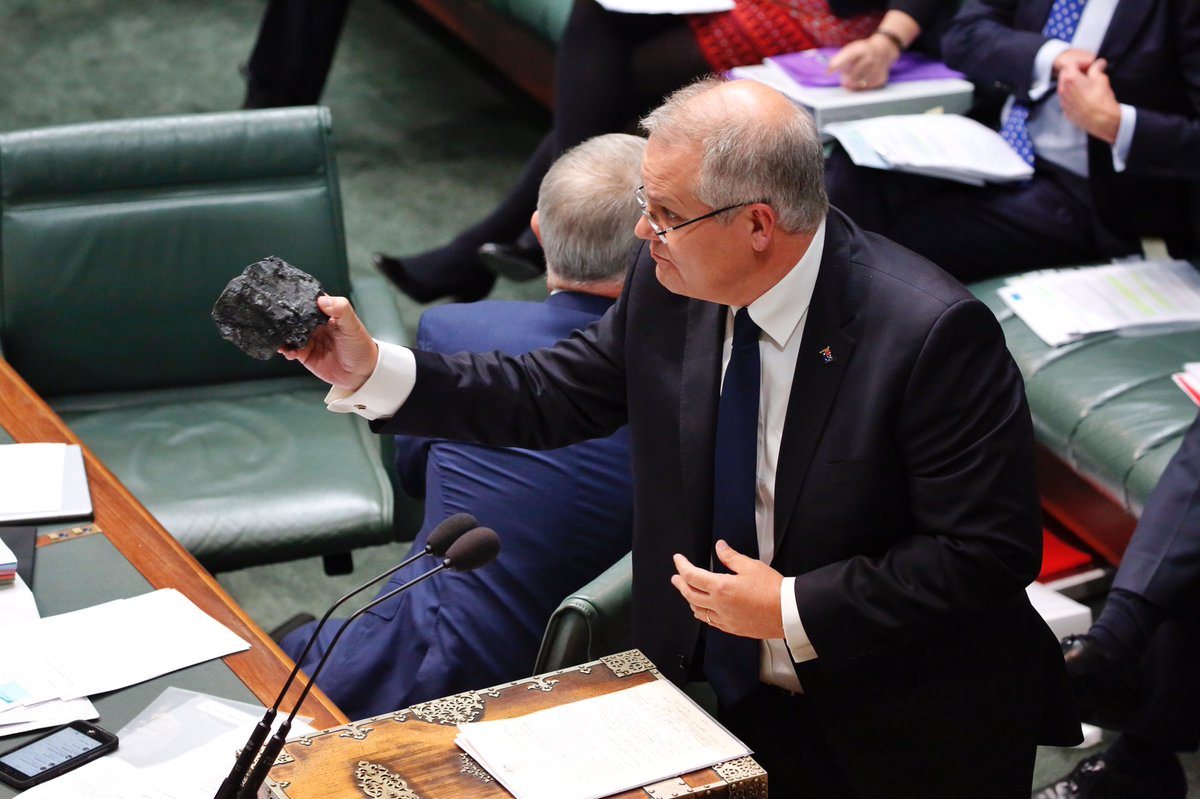Many Australians are in the middle of a scorching heat wave, with temperatures in parts of Sydney forecast to hit a mind-melting 44 degrees C, or 111 degrees Fahrenheit.
Some parts of the state of New South Wales could hit 48 C (118 F) in the shade in the coming days.
South Australia and southern parts of Queensland are also bracing themselves for the heat, with fears over power shortages, health impacts, and bushfires.
So a perfect time, then, for Australia’s Treasurer, Scott Morrison, to take a lump of coal into a parliamentary question time.
“This is coal — don’t be afraid, don’t be scared,” said Morrison, before handing the grapefruit-sized lump to his colleagues, who played around with the chunk of lignite in the manner one might toss a snowball before chucking it at an adversary.
Speaking of snowballs, the moment was reminiscent of that moment in 2015 when Republican Senator James “global warming is a hoax” Inhofe, took a snowball into the U.S. Senate to show that it was cold outside, disproving right there and then that global warming was even a thing.
The Australian MP‘s coal-carrying antics were a prop in a currently heated debate over the future of the country’s electricity supply.
The nation’s Energy and Environment Minister Josh Frydenberg has been attacking political opponents and state governments for ambitious renewable energy targets which he considers a risk.
Energy policy has been particularly high on the political agenda in recent weeks, with Prime Minister Malcolm Turnbull leading the charge for coal with a speech to the country’s National Press Club.
Many of the talking points being pushed by Turnbull and his ministers have been heavily influenced by sustained lobbying from the coal industry.
As I wrote just a few days ago, documents released under Freedom of Information rules show it can take literally minutes for coal industry lobbyists to secure a meeting with a senior Australian government official.
In short, the Liberal (actually conservative) government wants to build coal power plants that are slightly less dirty than older ones, and then wants the public to think that this equals action on climate change.
Almost nobody thinks this is a good idea. The latest and more efficient coal-burning plants, of which Australia has none, are expensive, would push up power prices at a time when the price of renewable options are dropping fast, and would need government subsidies. And they’re still not “clean.”
Even Matthew Warren, chief executive of the Australian Energy Council, which represents major coal generators and gas companies, has described new coal plants as “uninvestable” in Australia.
Warren said: “While lower emissions coal-fired power stations could be considered theoretically, in practice there is no current investment appetite to develop new coal-fired power in Australia.
“The industry’s investment focus has shifted to a combination of firm lower emissions gas generation, renewables and enabling technologies like storage.”
Australia has been suffering with a series of heat waves this summer, with Sydney in particular being hit hard after its hottest January on record.
Climate scientist Dr. Sarah Perkins-Kirkpatrick of the University of New South Wales Climate Change Research Centre in Sydney described the developing heat wave as “horrifying” and said people should not work or play outdoors.
“Much of eastern Australia has seen heat wave after heat wave this summer, with some seasonal records already broken by the start of February. Nighttime temperatures have been too hot for adequate sleep and daytime temperatures have been searing,” she said.
“Unfortunately, this is just a glimpse of the future, as human influence on the climate increases, so will the number and severity of heat waves and their deadly impacts.”
But according to Treasurer Morrison, coal can save Australia. Maybe Aussies could take shelter under it during the next scorcher.
Don’t be scared.
Main image: Australian Treasurer Scott Morrison holds up a lump of coal during parliamentary questions in February 2017. Credit: Australian Broadcasting Corporation/Nick Haggarty
Subscribe to our newsletter
Stay up to date with DeSmog news and alerts







